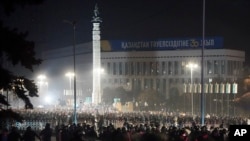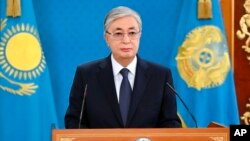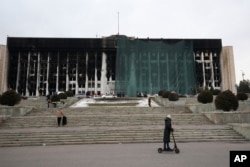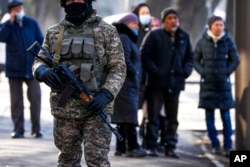Weeks after the conclusion of bloody protests across Kazakhstan, attention in the Central Asian nation has turned to whether the government is capable of impartially investigating their origins — and of moving toward greater democracy.
The protests began in early January over a sharp increase in fuel prices and rapidly escalated in the face of a harsh crackdown by authorities. By midmonth, 225 people were dead and more than 12,000 were being detained, while the damage to businesses from fires, looting and sabotage was estimated in the billions of dollars.
On a recent visit to Washington, Deputy Foreign Minister Akan Rakhmetullin told U.S. officials that Kazakhstan was committed to a thorough, transparent investigation of the January events — including a meaningful dialogue with civil society — in accordance with the rule of law.
But civil society leaders in Kazakhstan remain dubious, noting that government officials continue to claim the violence was the product of some ill-defined “terrorist” activity from outside the country, rather than a spontaneous uprising prompted by years of poor governance.
Some in Kazakhstan even suggest the protests were orchestrated from within the nation’s own ruling elite in a bid to undermine President Kassym-Jomart Tokayev, who took office in 2019 following the retirement of long-ruling President Nursultan Nazarbayev.
Independence demonstrated
Tokayev had been expected to serve as an interim figure pending his replacement by someone from Nazarbayev’s extended family, according to Sergei Gretsky, academic director of the Foreign Policy Academy at Georgetown University.
But Tokayev “did not live up to their expectations and was becoming increasingly independent,” Gretsky told an online forum at Harvard University.
For many civil society leaders, the handling of the investigation and the court cases against those arrested will be a test of whether the country can overcome endemic corruption and move toward greater democracy and respect for human rights.
“Human rights depend on the political context, and we are living in a totally authoritarian state,” argued Yevgeny Zhovtis, head of Kazakhstan’s International Bureau for Human Rights, an independent advocacy group, during the same Harvard forum on Central Asia.
Charging that Kazakhstan still lives with Soviet-style torture and lack of access to legal protections, he urged that the Kazakh court system be separated from the Ministry of Internal Affairs.
“We need new election legislation and a new constitution,” Zhovtis said.
Tokayev has told the country that socioeconomic changes must come first, and that only then will he push for political reforms.
'A sense of unfairness'
But Eldar Abdrazakov, CEO of the Kazakh financial services group Centras Capital, says political and economic reforms must move forward in tandem if Kazakhstan is to address the underlying issues behind the January protests.
“People see increasing inequality, no meritocracy, no way for educated people to prosper,” he said at the Harvard forum. “Growing inequality and intense corruption reinforce a sense of unfairness. … Today people are more prepared to fight the government because they don't see light at the end of the tunnel.”
Abdrazakov said he had not expected mass unrest of the kind that occurred in January. “Burning cars and buildings are unprecedented,” he said. But “inflation over the past year was 20 to 30 percent in real terms, far more than officially declared. And certainly, that was very painful for ordinary people.”
With widespread corruption in every sector, Abdrazakov expects strong pushback against reform initiatives. Nevertheless, he said, “we need to change the government’s top-down approach.”
Gretsky, the Foreign Policy Academy director, also predicted that corrupt officials would seek to sabotage any meaningful reforms. “You cannot just displace bureaucrats and politicians instantly,” he said.
Gretsky said new parties, established by popular leaders, would give the reform process credibility and legitimacy. But he cautioned against “the impatience of civil society activists who demand instant change and results,” denying Tokayev time to consolidate power.
“There have been frustrations and demands but no ideas or proposals from those who actively demand change. … They should offer their ideas on how Kazakhstan should change its political system,” he said.
Distrust in government
Aida Dossayeva, a specialist in strategic communications, said any reform effort would be complicated by a widespread and growing distrust in the government that has been made worse by its handling of the coronavirus pandemic.
“Criticism has become more regular and sharper, especially in social media,” she said, noting the authorities had no clear strategy for communicating about COVID-19 and failed to connect with the public.
Surveys conducted by Tan Consulting, headed by Dossayeva, indicate the public views the government as incapable of managing crises. People do not believe official reports and resent the government's deciding everything for them, the findings show.
Dossayeva noted complaints from residents of Almaty, the nation’s largest city and the scene of the most violent protests, that no one informed them what was happening in January because internet service had been cut off.
“Effective communication is a two-way process that involves clear messages delivered by appropriate channels and platforms to diverse audiences and shared by trusted people. Ultimately, success depends on public trust,” she said.







